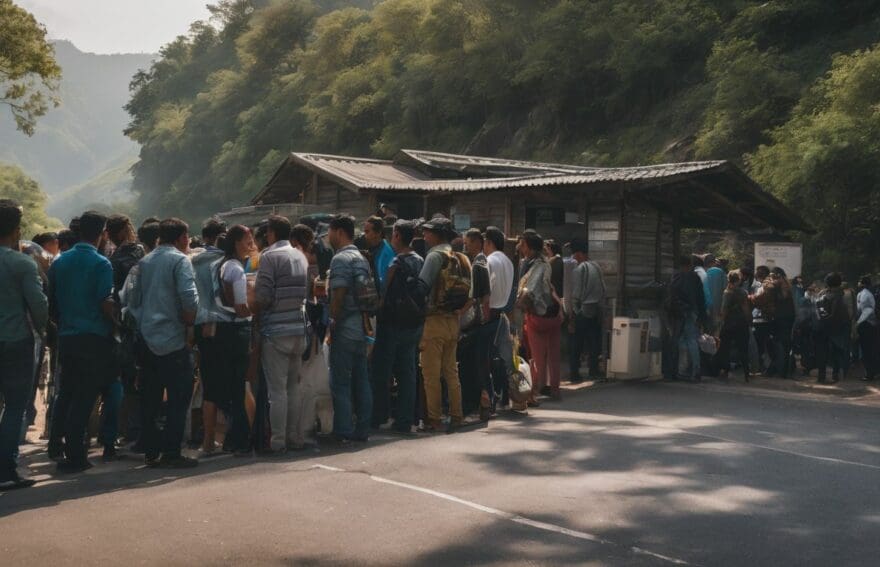Papers, Please: The Morality of Bureaucracy

Updated On: October 24, 2025 by 
Have you ever caught yourself deep in thought over the intricate interplay of morality and the rigid letter of the law? If so, know that you’re not alone. We’re eagerly delving into the profound world of bureaucratic decision-making, a theme richly portrayed in “Papers, Please,” where players step into the shoes of immigration officers.
As we unpack this deceptively straightforward game, it prompts us to scrutinise our ethical bearings amidst a thicket of rules and mandates. Join us as we uncover what’s hidden beneath the facade of routine administration; it promises to be far more stimulating than one might first imagine!
The Iron Cage of Bureaucracy
Weber’s theory of the iron cage discusses the monotony and oppressive nature of bureaucracy, which is replicated in the video game Papers, Please. This section explores how bureaucratic systems can restrict individual agency and ethical decision-making.
Weber’s theory
Max Weber, a renowned sociologist, introduced the concept of the “Iron Cage” to describe how increased rationalisation in society can lead to individuals feeling trapped by bureaucracy and regulations.
He believed that over time, bureaucracies become so focused on efficiency and rules that they dehumanise those who work within them and serve them.
In “Papers, Please,” players experience this firsthand as they grapple with government mandates while checking passports at border control. The game mirrors Weber’s idea by showing how repetitive tasks and strict guidelines can transform the workplace into an environment where rationality overshadows morality.
As bureaucrats in the game, we must constantly decide whether to adhere strictly to regulations or bend the rules out of compassion—choices that echo real bureaucratic ethics dilemmas faced every day.
Monotony and oppressive nature
The game “Papers, Please” effectively captures the oppressive nature of bureaucratic work, immersing players in the monotony and control of administrative tasks. The gameplay perfectly reflects Max Weber’s theory of the Iron Cage, trapping players within a system that restricts their freedom and dictates their actions.
Players experience firsthand the soul-crushing repetitiveness and compliance demanded by government regulations, bringing to light the ethical implications of operating within such constraints.
Immersed in the bureaucratic world, players are confronted with workplace monotony that mirrors real-world administrative constraints. Through paperwork gameplay, “Papers, Please” provides an unsettling reflection on societal control through bureaucracy while highlighting the accountability and legalism associated with public service.
Replication in Papers, Please
“Papers, Please” effectively replicates the monotony and oppressive nature of bureaucratic work through its gameplay. The game traps players in the iron cage of bureaucracy, mirroring Weber’s theory on administrative morality.
As players engage in paperwork tasks, they become complicit in projecting state power, adding depth and complexity to the gaming experience. “Papers, Please” presents ethical dilemmas reminiscent of those faced in real bureaucratic settings, forcing players to make moral decisions within the confines of bureaucratic regulations.
The game successfully captures the moral issues and ethical challenges inherent in bureaucratic work while engaging players in a disturbingly relevant experience. It delves into the complex interplay between morality, rationality, and bureaucracy, making it a thought-provoking experience for gamers from all walks of life.
Morality and Rationality in the Game
Players are faced with moral dilemmas as they navigate the bureaucracy of border control, forcing them to make rational decisions that may conflict with their ethical beliefs. The game raises questions about how bureaucracy can impact morality and the ethical implications of following strict regulations in governance.
Moral dilemmas faced by players
Players are confronted with difficult ethical decisions as they navigate the bureaucratic system in “Papers, Please.” The game presents situations where players must balance their moral compass with the pressure to comply with bureaucratic regulations.
In this way, “Papers, Please” effectively immerses players in the complexity of ethical decision-making within a rigid and oppressive system.
As players progress through the game, they are forced to grapple with imperfect and incomplete information while making morally significant choices. These decisions have direct consequences for both individual characters and larger societal implications within the game world.
Rational decision-making
Players are placed in morally challenging situations throughout “Papers, Please”. The game requires them to make tough choices with incomplete information. This compels players to navigate ethical dilemmas while upholding bureaucratic regulations.
As a result, the gameplay emphasises how rational decision-making is often intertwined with moral issues, providing a thought-provoking experience that mirrors real-world bureaucratic challenges.
The game’s focus on rational decision-making amidst moral complexities adds depth and relevance to the overall gameplay. Players must grapple with the repercussions of their choices, shedding light on the ethical implications of bureaucracy within the confines of its rules and regulations.
How bureaucracy affects morality
Bureaucracy influences morality by placing individuals in ethical dilemmas within the system. The game “Papers, Please” forces players to make moral decisions under the pressure of bureaucratic regulations and state power.
This compels them to balance ethical considerations and face imperfect information, reflecting the complex nature of moral decision-making within bureaucracy.
The game captures the real-world challenges of navigating morality in a bureaucratic setting. Players find themselves confronted with tough choices, mirroring the moral and ethical complexities present in actual bureaucratic work.
Escaping the Iron Cage
We will explore the possibility of a happy ending in Papers, Please and how players can subvert the system through their choices. Interested to learn more about the game’s thought-provoking themes? Keep reading!
Possibility of a happy ending
Players can influence the outcome of “Papers, Please” through their choices, potentially paving the way for a positive resolution. By carefully navigating moral dilemmas and bureaucratic obstacles, players can impact the fate of both themselves and others within the game’s world.
The decisions made throughout the gameplay have a direct bearing on whether a hopeful conclusion can be achieved.
The potential for a happy ending in “Papers, Please” hinges on players’ ability to subvert the system and make conscientious decisions while confronting challenging bureaucratic norms.
Subverting the system
Players have the ability to subvert the oppressive system in “Papers, Please.” By strategically supporting resistance groups and making calculated moral choices, players can challenge the authority of the state and seek a more fulfilling outcome.
The game’s emphasis on individual agency allows players to creatively navigate through bureaucratic constraints, presenting opportunities for defiance that ultimately impact the game’s narrative trajectory.
Empowering players to influence their fate within a rigidly structured system fosters an engaging gameplay experience that encourages critical thinking and ethical reflection. This element adds depth to the overall gaming experience, allowing for multiple avenues of exploration and discovery as individuals assert their autonomy amid an environment defined by regulations and control.
Role of the player’s choices
The player’s choices in “Papers, Please” directly influence the game’s outcomes. By deciding who to admit or deny entry, players navigate moral and ethical dilemmas while facing bureaucratic regulations.
These decisions impact not only the lives of virtual characters but also reflect the complex nature of making ethical choices within a system that prioritises rules over humanity. The game immerses players in the challenging reality of balancing morality and rationality within a bureaucratic setting, offering an eye-opening experience into the complexities of governance and individual decision-making.
Players grapple with the consequences of their actions as they choose between following regulations and prioritising human empathy. Each decision reinforces the game’s exploration of moral ambiguity within bureaucratic environments, emphasising how individuals must navigate conflicting values when faced with institutional pressures.
Critiques and Controversies
Amidst the praise, Papers, Please has faced criticisms for perpetuating stereotypes and its impact on immigration discourse. These controversies have sparked important discussions about the game’s portrayal of bureaucratic systems and their effects on morality.
Accusations of perpetuating stereotypes
The game has faced criticism for perpetuating stereotypes, particularly in its portrayal of immigration issues. Some argue that the game oversimplifies the complexities of immigration and paints a one-dimensional picture of immigrants and border control.
Critics point out that the game’s mechanics can contribute to reinforcing negative stereotypes about both immigrants and bureaucratic workers.
However, defenders of the game argue that it offers a nuanced exploration of moral decision-making within bureaucratic systems, forcing players to confront difficult choices rather than simply endorsing stereotypes.
Impact on immigration discourse
Moving on from the criticisms of perpetuating stereotypes, let’s delve into the impact of “Papers, Please” on immigration discourse. The game sheds light on the ethical decisions and moral complexities individuals face within a bureaucratic system.
It offers players an immersive experience that reflects real-world immigration challenges and forces them to grapple with difficult moral dilemmas related to border control, visa issuance, and refugee acceptance.
The gameplay not only adds depth and complexity to the gaming experience but also provides a thought-provoking insight into the intricate interactions between bureaucracy and immigration policy.
Countering criticisms
Some critics argue that “Papers, Please” perpetuates negative stereotypes about immigration and border control. However, the game presents players with complex moral dilemmas and does not simplify these issues into black and white scenarios.
Rather than glorifying bureaucracy, it sheds light on the oppressive nature of such systems and invites players to question their own complicity within them.
Critics’ concerns regarding the impact on immigration discourse are valid; however, the game’s portrayal of bureaucratic work serves as a thought-provoking commentary rather than an endorsement of its practices.
Conclusion: Papers, Please as a Thought-Provoking Game
The game “Papers, Please” offers a thought-provoking exploration of the morality and ethics inherent in bureaucratic systems. Players are confronted with challenging moral dilemmas that reflect the complexities of real-world bureaucratic work.
Through engaging gameplay, the game immerses players in the ethical challenges and difficult decisions faced within bureaucratic environments. “Papers, Please” serves as a compelling platform for examining the impact of bureaucracy on individual morality and rational decision-making.
FAQs
1. What is “Papers, Please” about?
“Papers, Please” is a game that challenges players with ethical decision-making as they act out the role of an immigration officer in a fictional bureaucracy shaped by fascism.
2. Does the game require players to make rational decisions?
Yes, throughout “Papers, Please”, players have to use rational decision-making to handle difficult moral dilemmas and bureaucratic scenarios presented in the gameplay.
3. Can “Papers, Please” teach me about morality in government roles?
Indeed! The game encourages you to reflect on the complexity of morality within a bureaucratic system and examine how power and authority influence ethical choices.
4. Are there consequences for my decisions in “Papers, Please”?
Absolutely – every choice you make can lead to different outcomes affecting your character’s life and highlighting the weight of moral responsibility under a regime influenced by fascism.









